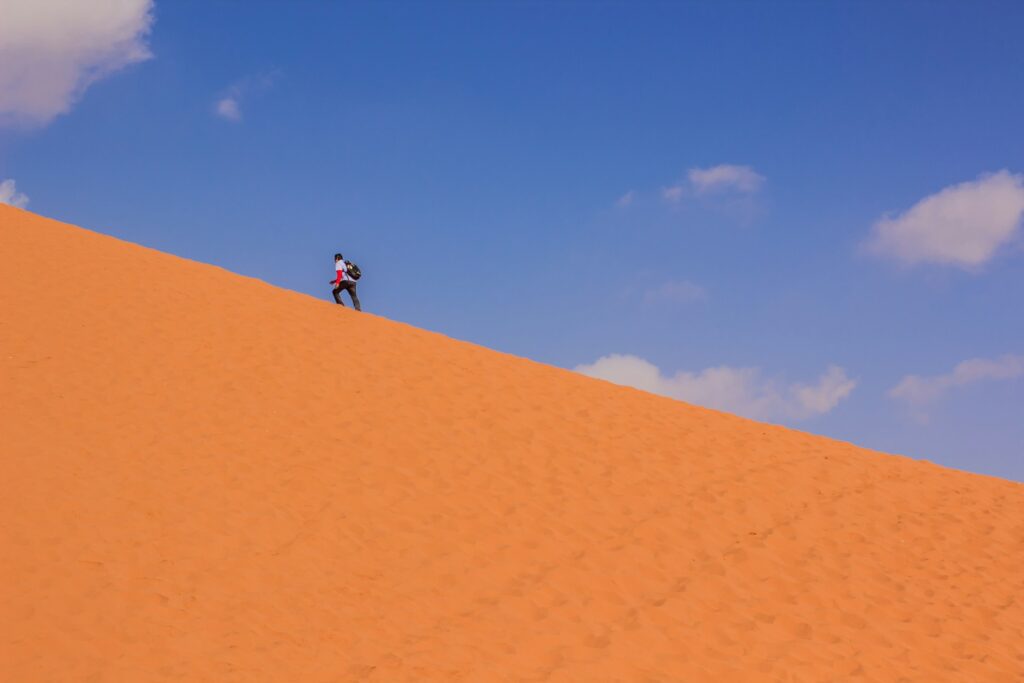Before Your Trip to Jordan
Before you head off on your trip to Jordan, it’s important to make sure you’re ready to make the most of your visit to this historically rich and culturally diverse country. From the ancient city of Petra to the serene waters of the Dead Sea, Jordan has it all: natural wonders and historical sites. Knowing the local customs, weather, and what you need to travel with will make sure everything goes smoothly and you have a great experience.
The Weather in Jordan
Jordan experiences a diverse climate due to its varied topography, ranging from deserts to highlands. The country generally enjoys a Mediterranean climate in the west, with mild, wet winters and hot, dry summers. In contrast, the eastern and southern parts, including the famous Wadi Rum and the Dead Sea area, have a more arid desert climate. Winter temperatures in these desert areas can drop significantly at night, while summers can reach extremely high temperatures, often exceeding 40°C (104°F). The western regions, including Amman and Petra, experience milder winters with temperatures ranging between 5°C and 15°C (41°F to 59°F) and warm summers averaging around 30°C (86°F).
Spring and autumn are considered the most pleasant times to visit Jordan. During these seasons, temperatures are moderate and ideal for outdoor activities. Spring brings blooming landscapes and comfortable temperatures ranging from 15°C to 25°C (59°F to 77°F), while autumn offers similarly mild conditions. However, travelers should be prepared for occasional rain showers, particularly in the spring. Overall, Jordan’s climate varies greatly depending on the region and season, so packing accordingly is crucial for a comfortable and enjoyable visit.

How to Dress in Jordan – Seasonal Considerations
Spring
Spring in Jordan is mild and pleasant, with temperatures ranging from 20°C to 25°C (68°F to 77°F). This season is ideal for light layers, such as long-sleeved shirts, lightweight sweaters, and comfortable pants or skirts. Mornings and evenings can be cooler, so packing a light jacket or shawl is advisable. When visiting religious or cultural sites, it’s respectful to wear modest clothing that covers shoulders and knees.
Summer

Summers in Jordan can be extremely hot, especially in desert areas and the Jordan Valley, with temperatures often exceeding 30°C (86°F). Light, breathable clothing made of natural fabrics like cotton or linen is recommended to stay cool. A wide-brimmed hat, sunglasses, and sunscreen are essential for protection against the intense sun. Loose-fitting clothes are also practical for maintaining comfort and modesty. For those planning to visit the Dead Sea, a swimsuit and water shoes are useful, but modesty is advised in public areas.
Fall
Fall offers cooler and more comfortable temperatures, typically ranging from 15°C to 25°C (59°F to 77°F). Layered clothing is ideal for this season, as it can be warm during the day and cooler in the mornings and evenings. A light sweater or jacket is useful for transitional weather. As always, modest dress is appreciated, particularly in more conservative areas and when visiting religious sites.
Winter
Winter in Jordan can be cool to cold, particularly in the highlands and desert regions. Temperatures can drop to 5°C to 15°C (41°F to 59°F) in cities like Amman, with even colder conditions in the mountains, where snowfall is possible. Warm clothing such as a heavy coat, sweaters, and thermal layers is recommended. In desert areas, temperatures can drop significantly at night, so packing warm layers is crucial. A scarf and gloves can also be helpful for staying warm. Regardless of the season, comfortable walking shoes are advisable for exploring the diverse landscapes and historical sites of Jordan.
The Currency in Jordan

The official currency of Jordan is the Jordanian Dinar, abbreviated as JOD or JD. The dinar is subdivided into 100 qirsh, also known as piastres, and further into 1000 fils. Banknotes are available in denominations ranging from 1 to 50 dinars, while coins are available in various denominations including 1, 5, 10, 25, and 50 piastres, and 1 dinar.
In Jordan, the Jordanian Dinar is widely accepted for all transactions, from shopping and dining to transportation and accommodation. While major credit and debit cards are commonly accepted in urban areas, hotels, and larger establishments, carrying some cash is advisable, especially when traveling to rural areas or small towns where card acceptance may be limited. ATMs are widely available in cities and tourist areas, allowing for convenient access to cash.
Which Currency Can Tourists Use in Jordan?
The official currency of Jordan is the Jordanian Dinar (JOD), commonly referred to as “JD.” It is the only currency accepted for transactions in most places throughout the country. While major tourist areas and some larger establishments may accept U.S. dollars or euros, it is generally advisable to use Jordanian Dinars for purchases. Credit cards are widely accepted in hotels, restaurants, and larger shops, but it is recommended to carry some cash for smaller vendors, taxis, and places where card payments are not available.
Where to Exchange Money in Jordan?
Money can be exchanged at airports, banks, exchange bureaus, and major hotels in Jordan. Exchange rates are generally competitive, though airport rates may be slightly less favorable. Banks typically offer good rates and are a safe option for currency exchange. Exchange bureaus are widely available in cities and tourist areas, providing convenient services. ATMs are also widely accessible in urban areas and accept international cards, allowing you to withdraw Jordanian Dinars directly.
Tips for Exchanging Money in Jordan
When exchanging money in Jordan, it is wise to compare rates between different exchange services to get the best deal. Avoid exchanging money with street vendors, as they might offer unfavorable rates or counterfeit currency. Always count your money and check the receipt before leaving the counter to ensure you received the correct amount. If using ATMs, opt for those inside banks or well-lit areas for added security. Additionally, keep smaller denominations of Jordanian Dinars handy for tipping, small purchases, or using local transportation.











